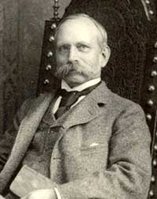Chandler, Charles F.

| Topics: |
Charles F. Chandler (1836–1925), American industrial chemist, was a pioneer in his commitment to both the urban and natural environments. His work with New York City's Metropolitan Board of Health between 1867 and 1883 provided a model for health and environmental laws and regulatory agencies nationwide by monitoring food and drugs, providing free vaccinations, ensuring the safety of milk supplies, bringing clean water into the city, and enacting building codes with adequate provisions for indoor plumbing (which he personally designed with appropriate trapping systems). Health problems were created not only by large numbers of people living in unprecedented proximity, but also by a burgeoning, if still chemically primitive, industry: the "nuisances" of noxious gases and acids discharged in sludge; dangerous products (e.g., kerosene that contained explosive naphtha fractions); and adulterated food, beverages, and cosmetics.
Chandler, the eldest son of an old and moderately successful New England family, prepared for his multifaceted career by attending Harvard University, after which he sailed for Germany. There he studied for his doctorate with Friedrich Wöhler and Heinrich Rose, another former Jöns Jakob Berzelius student who followed up his teacher's interest in mineralogy and analytical chemistry. Charles's younger brother William, who also became a prominent figure in American chemistry, was instead educated in the United States—at Union College, Columbia School of Mines, and Hamilton College, from which he received his doctorate. At Union and at the School of Mines, William studied and worked with Charles, who established modern chemical studies at both institutions. At a time when salaries and fees were very low for academic chemists and holding multiple appointments was common, Charles conveyed the excitement of chemistry to students at Columbia College, the New York College of Pharmacy, and the College of Physicians and Surgeons as well—the three of which eventually joined to become Columbia University.
Although Charles was preeminent as a sanitarian, he became equally famous as a consulting industrial chemist, a lucrative complement to his academic income. His range of chemical interests was extraordinary and included such topics as sugar, petroleum, illuminating gas, photographic materials, aniline dyes, and electrochemistry as well as the analysis of water and minerals more typical of a contemporary consulting chemist. He regarded industry as an exciting career opportunity for his many students, unlike some fellow academics, whose attitudes were more "ivory tower."
Charles Chandler was also a genius at organizing the American chemical community. He served as chairman of the chemists who gathered in 1874 at the grave of Joseph Priestley in Northumberland, Pennsylvania, to celebrate the centennial of the discovery of oxygen. At this meeting the notion of founding a national chemical society was conceived. The idea was publicized in American Chemist, a chemical journal that Charles and his brother—by then chairman of chemistry at Lehigh University—edited from 1870 to 1877. Charles was a prime mover in founding the American Chemical Society (ACS) in 1876 and its Journal of the American Chemical Society, which succeeded American Chemist. He served as president of the ACS in 1881 and 1889. He was elected the second chairman of the New York (later American) Section of the Society of Chemical Industry and was the first American to be chosen president of the London-based parent society (1899–1900). He was also an organizer and the first president (1898–1900) of The Chemists' Club, a club whose goal was to foster a social and professional identity in the chemical community associated with the nascent American chemical industry, then centered in New York City.
Further Reading